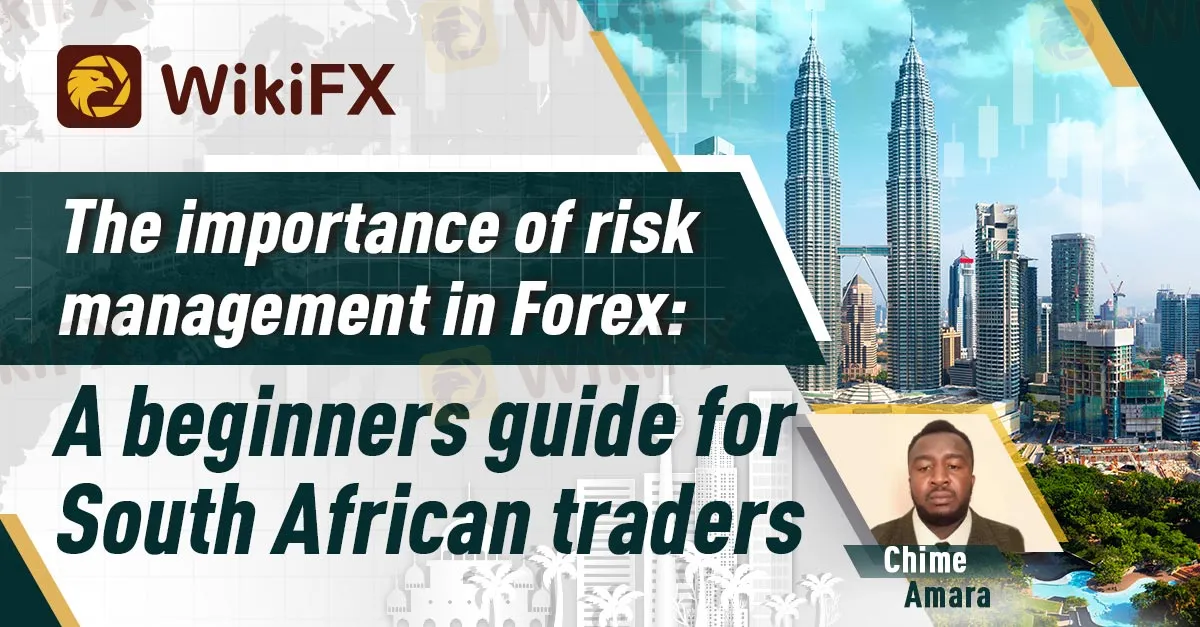简体中文
繁體中文
English
Pусский
日本語
ภาษาไทย
Tiếng Việt
Bahasa Indonesia
Español
हिन्दी
Filippiiniläinen
Français
Deutsch
Português
Türkçe
한국어
العربية
The importance of risk management in Forex: A beginner’s guide for South African traders
Abstract:The quest to make quick profits from the market has often led some traders to neglect the need for applying proper risk management practices while taking any positions in the market. Some traders tend to trust so much in the accuracy of their analysis and predictions that they neglect that the market can as well disappoint. The outcome of this negligence is always unbearable and often, had resulted in such traders losing their entire capital. Proper risk management practices remain the best way for guarding against loss and remaining profitable in the forex market today.

By: Chime Amara

What is Risk management?
Risk management is the practice of guarding against excessive loss by protecting one's position should the market go contrary to the trader's predictions.
What are the risk management practices?
There are basically four major risk management practices obtainable in forex trading. We have discussed them below.
A. Use of Stop loss: Stop loss is an important risk management practice that involves setting a pending order below or above one's position to close one's open position should the market take the opposite course of the trader's forecast. Often a Stop loss order is set 30 - 50 pips away from one's entry. Some prefer mapping out only 1% of their capital as the stop loss target.
B. Setting take-profit target: The fact that the market often spiked to hit certain levels and then reverse from it, has made it very necessary for traders to set their targets for each position they take in the market today. Setting a take-profit order helps to close one's trades when the market gets to the indicated level.
C. Correct use of Lotsize: Lotsize is the buying power due to each trader based on his capital. One of the greatest means through which traders can manage their risk well is by choosing the correct lotsize due to their capital. Using excessive lotsizes endangers the trader's capital in cases where the market goes against him.
D. Hedging: Hedging involves taking two different positions at the same time in the market as a way of guarding against loss. Here the trader often placed a new trade above or below his stoploss to be triggered in cases when the market reverses and cuts off his stop loss target. Similarly, hedging includes but is not limited to taking two opposite positions at the same time.
Conclusion
The importance of risk management practice in forex trading can never be overemphasized. Thus, without proper risk management practice put in place, the trader is all the more exposed to losing a greater part of his capital due to high market volatility. It is therefore necessary for all forex traders to apply proper risk management practice while taking any positions in the market today.

Disclaimer:
The views in this article only represent the author's personal views, and do not constitute investment advice on this platform. This platform does not guarantee the accuracy, completeness and timeliness of the information in the article, and will not be liable for any loss caused by the use of or reliance on the information in the article.
Read more

The Daily Habits of a Profitable Trader
Every professional trader follows a structured approach to ensure they are well-prepared, disciplined, and able to seize opportunities with confidence. Whether you are a seasoned investor or an aspiring trader, adhering to a robust daily checklist can significantly enhance your performance. Use this checklist to check if you are a qualified trader

The Impact of Interest Rate Decisions on the Forex Market
Interest rate changes determine currency attractiveness, influencing capital flows and exchange rate trends. Understanding this mechanism helps investors navigate the forex market effectively.

How a Housewife Lost RM288,235 in a Facebook Investment Scam
A 47-year-old housewife in Malaysia recently fell victim to an online investment scam, losing a substantial sum of RM288,235 after engaging with a fraudulent scheme advertised on Facebook.

A Trader’s Worst Mistake: Overlooking Broker Reviews Could Cost You Everything
In today’s digital age, reviews influence nearly every decision we make. When purchasing a smartphone, television, or home appliance, we pore over customer feedback and expert opinions to ensure we’re making the right choice. So why is it that, when it comes to choosing an online broker where real money and financial security are at stake many traders neglect the crucial step of reading reviews?
WikiFX Broker
Latest News
TradingView Brings Live Market Charts to Telegram Users with New Mini App
Trump tariffs: How will India navigate a world on the brink of a trade war?
Interactive Brokers Launches Forecast Contracts in Canada for Market Predictions
Authorities Alert: MAS Impersonation Scam Hits Singapore
Stocks fall again as Trump tariff jitters continue
INFINOX Partners with Acelerador Racing for Porsche Cup Brazil 2025
Regulatory Failures Lead to $150,000 Fine for Thurston Springer
April Forex Trends: EUR/USD, GBP/USD, USD/JPY, AUD/USD, USD/CAD Insights
March Oil Production Declines: How Is the Market Reacting?
Georgia Man Charged in Danbury Kidnapping and Crypto Extortion Plot
Currency Calculator







